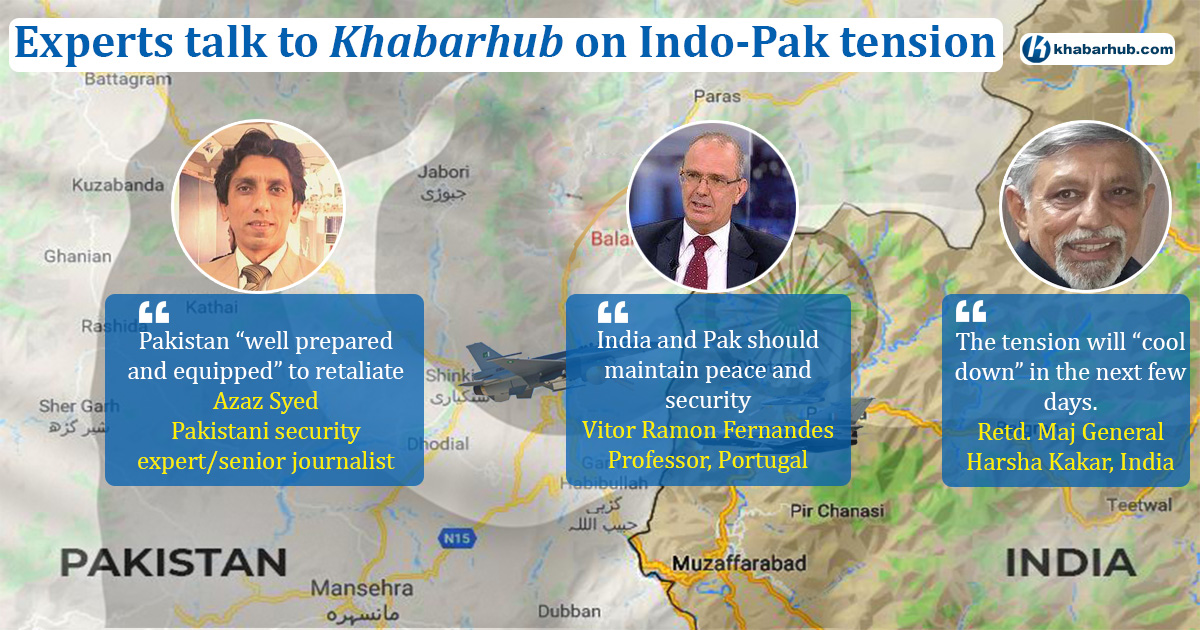KATHMANDU: Amid heightened tensions between India and Pakistan following India’s “pre-emptive air strikes” targeting Pakistan-based terror group Jaish-e-Mohammed’s camp, an Indian retired Maj. General claims the tension will “cool down” in the next few days.
Talking to Khabarhub from Lucknow, Retd. Maj General Harsha Kakar labeled this as a temporary affair. “Pakistan was under immense internal pressure to act. Opposition parties might have put pressure on the government to act,” he told Khabarhub.
He is, however, hopeful that the ongoing tension will “cool down” in the next few days.
However, Azaz Syed, a Pakistani security expert, and senior journalist claimed Pakistan is “well prepared and equipped” to retaliate India’s actions.
“Pakistan is well prepared to retaliate India’s move anytime,” he told Khabarhub from Islamabad.
According to him, there has been heightened tension in the country after both the countries claimed of “downing” each other’s fighter aircraft on Wednesday.
While the Pakistani army has claimed they have shot down two Indian aircraft on Wednesday, the Indian army said they “downed” a Pakistani aircraft near the Line of Control (LoC).
Maj. Gen. Asif Ghafoor, spokesperson of the Pakistan Armed Forces tweeted that Pakistani army shot down two Indian aircraft inside Pakistani airspace. According to him, one of the aircraft fell inside AJ&K while others fell inside IOK.
Ghafoor claimed that one of the aircraft fell in Pakistan-controlled territory while the other fell in the Indian side, according to India media.
Meanwhile, India has claimed of shooting down Pakistan F-16 that violated the Indian space on Wednesday.
“There is a long history of tensions and wars between India and Pakistan. However, I believe it is in the interest of both states to try and maintain peace and security in the region. It is very important that both India and Pakistan exercise restraint, and avoid escalation, particularly given that they both have nuclear capabilities,” Vitor Ramon Fernandes, Associate Professor of International Relations, University of Lusiada, Portugal, told Khabarhub.
Nepal’s security expert Dr. Deepak Prakash Bhatta, meanwhile, said Nepal, as the Chair of SAARC, should endeavor to amicably deescalate the tension and cool down both the nuclear powers.
“Nepal should act on the basis of “Panchesheel” by taking the side of none. “Most importantly, Nepal government should lobby with the Indian side that the latter does not deploy Gorkha army in the conflict zone,” he said.
Nepal’s stance
The Government of Nepal said it is concerned about the escalating tensions between India and Pakistan following the terrorist attack on security forces in Pulwama in Jammu and Kashmir on February 14, 2019.
Nepal had earlier condemned this ‘heinous’ terrorist act.
A press statement issued by the Ministry of Foreign Affairs (MoFA) said as the current Chair of SAARC, Nepal “calls on both sides to exercise utmost restraint and not engage in actions that would threaten peace and security” in the region.
The MoFA has also urged both the countries to seek a solution through dialogue and peaceful means in order to ease tension.
India-Pak conflict: Security high alert in Nepal
Nepal Police have beefed up security condition along the Nepal-India border and airport areas following the escalation of tension between India and Pakistan.
Nepal Police has maintained high alert security following the heightened tension between Pakistan and India in view of the possible infiltration into Nepal, Uttam Raj Subedi, spokesperson of Nepal Police, told Khabarhub.
According to Subedi, security has been beefed up along the airport areas and Nepal-India borders to ensure that Nepali land will not be used against India and Pakistan.
Nepal Police is equally aware of the possible influx of refugees. The security has been heightened after an unsuccessful attempt was made to hijack a Dubai-bound plane in Dhaka, the capital city of Bangladesh on Sunday.









Comment